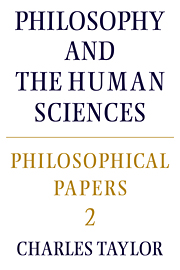Book contents
4 - Understanding and ethnocentricity
Published online by Cambridge University Press: 05 June 2012
Summary
The main thesis of the last chapter has been that we ought to turn to look at what we do when we theorize; that when we do we see that theories serve more than descriptive and explanatory purposes, they also serve to define ourselves; and that such self-definition shapes practice. But if all this is true, I argued, then the use of theory as self-definition also has to be borne in mind when we come to explain, when we practise, social science.
For even though theory may be serving us, the social scientists, simply as an instrument of explanation, the agents whose behaviour we are trying to explain will be using (the same or another) theory, or prototheory, to define themselves. So that whether we are trying to validate a theory as self-definition, or establish it as an explanation, we have to be alive to the way that understanding shapes practice, disrupts or facilitates it.
But this raises a number of questions about the relation between the scientist's explanatory theory and the self-definitions of his subjects. Suppose they offer very different, even incompatible, views of the world and of the subjects' action? Does the scientist have the last word? Can he set the world-view of his subjects aside as erroneous? But to condemn this world-view does he not have to stand outside it, and is this external stance compatible with understanding their self-definitions?
We come here to one of the main issues of the debate around verstehende social science. And this had to arise.
- Type
- Chapter
- Information
- Philosophical Papers , pp. 116 - 133Publisher: Cambridge University PressPrint publication year: 1985
- 28
- Cited by



